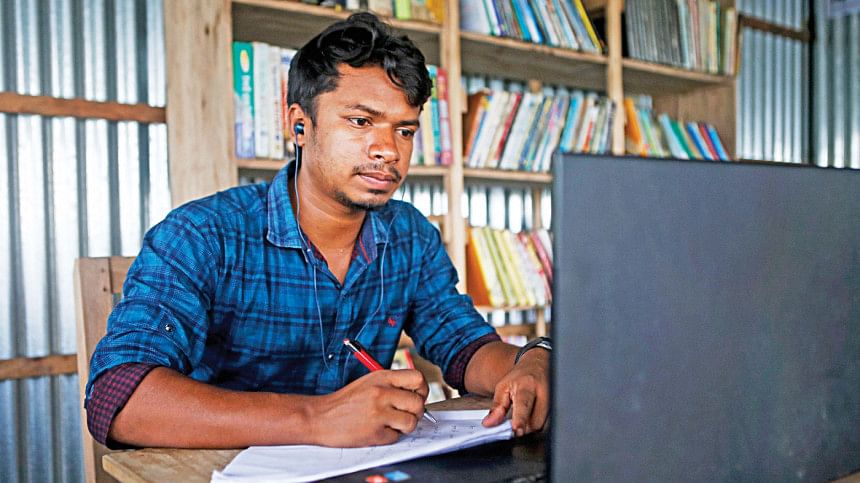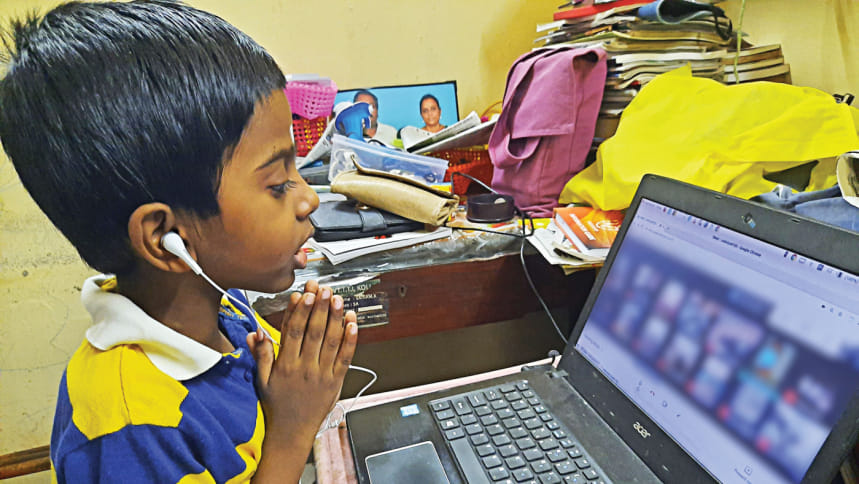Paving way for a more inclusive Bangladesh

Bangladesh is a highly centralised country. With most opportunities being centralised to Dhaka, one of the most expensive cities in South Asia, students in Bangladesh need to cross two significant barriers, geographical and financial, to access quality education.
On the contrary, the digitisation of Bangladesh has occurred nationwide. This raised an opportunity to bridge some of that gap in access to resources between students in Dhaka and those in rural and suburban areas. Ed-tech or Online learning platforms were very quick and successful in grabbing that opportunity, with a notably accelerated growth in their reach and prominence during the push to online learning during the Covid-19 pandemic.
Throughout the nation, students require guidance and mentorship to prepare for significant academic milestones, such as the SSC and HSC board exams and university admission tests. This is most popularly offered through coaching classes.
Throughout the nation, students require guidance and mentorship to prepare for significant academic milestones, such as the SSC and HSC board exams and university admission tests. This is most popularly offered through coaching classes. However, before the advent of Ed-tech platforms, the most qualified teachers and the best educational resources were usually available in Dhaka. Students outside of Dhaka would face a competitive disadvantage. Now, with the rising availability and prominence of Ed-tech platforms, some of that gap has been bridged. "Now, the people in rural and suburban areas can access educational content created by the same individuals providing that very service in person in Dhaka," shared Sakib Bin Rashid, Content Consultant and Professional Trainer at 10 Minute School, the nation's most widely known online learning platform.

Due to the flexibility and personal control over timing, learners who have to work full-time can access education that they previously would not have been able to, due to time constraints, inflexible coaching hours, and commute time and its added cost. For independent learning, a wide range of courseoptions, most popularly on skill-building for professional development, are available online.
Momen Tazwoar Momit, a student at BUET and founder of Facebook-based learning platform Physics+ICT Junction, has been involved with Ed-Tech for over 5 years. Recently, he started his own platform. "To be honest, it all started during Covid. As we were compelled to move online, the education market shifted drastically. Previously, a rural student didn't get access to quality content. Online education provides quality content at an affordable price, giving everyone a fair shot. Now if a student has a smartphone and stable internet, they can compete against any student in the country," was his hopeful insight on the merits of online learning platforms.
The efforts of these platforms to reach students from outside of Dhaka have been very successful, as per available data. According to the 2023 Learners Report of Shikho, a prominent online learning platform, 58% of learners availed from rural districts and 11% availed from semi-urban districts, with the top exam scorers being from Rajshahi, Rangpur, and Khulna, in that order. The highest learning times were held in order by Sylhet, Chattogram, and Rangpur. Rashid shared with us that over half of the users at 10 Minute School avail from outside of Dhaka.
The numbers are just as hopeful with emerging platforms. "Seventy per cent of my students are from outside Dhaka and roughly half of them are from rural areas where quality teachers are unavailable. Some of my students now have the opportunity to dream big and I am so proud that I could be a part of it," shared Momit.
In terms of cost, online learning is consistently more economical, making quality education accessible to a much wider demographic of learners nationwide.
"For example, a full 18-month HSC online course at 10 Minute School would cost 10,000 Taka. If you compare that with physical coaching centres and assume the lowest average of about 3000 Taka per month, that would amount to 36 thousand Taka in one year. Thus, the cost is drastically different," explained Rashid upon being asked how costs would compare across options.
This trend of lower, more accessible costs is consistent across platforms. Shahir Chowdhury, Founder of Shikho, shared, "Our founding mission has always been to democratise access to high-quality education for students across Bangladesh. We do this by removing geographical barriers and affordability limitations by harnessing the power of the internet and using the smartphone as the medium

of dissemination. We charge 100 Taka per subject per month."
Online learning platforms offer a range of benefits that make education more accessible in ways beyond geographical barriers and direct costs. This is clearly illustrated in AM Fahad's experience, a recent HSC graduate who used online learning platforms as a substitute for coaching centres, "My school was very far from home. Most online platforms covered everything I needed to prepare for my exams, therefore I didn't have to look for private tutors or coaching classes. This approach made education more accessible to me both economically and in terms of time saved from commuting.
Online platforms are much cheaper and flexible compared to coaching classes where it is easy to fall behind very quickly if you end up missing a class, especially when you have a high workload."
Upon being asked about any benefits beyond the expected that he had received from choosing to use online learning platforms, Fahad expressed, "I feel like the real benefit of using an online platform to study lies in its flexibility. I was able to access study materials, lectures, and exam sheets at any time of the day. Most of these platforms have their own problem-solving Facebook groups where instructors or peers will reply within minutes of posting a problem. An online platform lets me be more flexible with my time and allows me to allocate the time saved into hobbies and personal time, which is hard to find when you have multiple coaching classes to chase after school."
On the question of any limitations of online learning platforms in Bangladesh, Sakib Bin Rashid shared that it has not been possible to arrange for comprehensive testing or examinations yet. But consistent work is ongoing to eliminate this limitation.
However, the many merits of online learning platforms outweigh the present limitations.
Due to the flexibility and personal control over timing, learners who have to work full-time can access education that they previously would not have been able to, due to time constraints, inflexible coaching hours, and commute time and its added cost. For independent learning, a wide range of course options, most popularly on skill-building for professional development, are available online.

The growth potential of the field is endless and very hopeful. Some things we can expect in the future are online platforms using adaptive learning technologies to tailor courses to individual student's needs, providing a more personalised learning experience. This can help students progress at their own pace and receive targeted support where needed. We can hope for online platforms to incorporate accessibility features, such as subtitles, transcripts, and screen reader compatibility, to accommodate learners with disabilities. These developments will make education more holistically accessible to an even wider demographic.
At its present state, I believe the most hopeful beneficiaries of the advent of online learning platforms are young school-going children and board exam candidates. They allow them to forego the intensive coaching schedules after school, engage in more recreation, and access a more well-rounded education, at their own pace, with less economic burden, and access similar quality of resources and content regardless of geographical or financial privilege.
Amrin Tasnim Rafa is a sub-editor at Campus.

 For all latest news, follow The Daily Star's Google News channel.
For all latest news, follow The Daily Star's Google News channel. 







Comments